#Athenian tyrants
Text
Not the ancient Greeks making a very tall but handsome woman cosplay as Athena in order to trick Athens into accepting a tyrant (rumored to be gay or at least bi) who was also having anal sex with his 2nd wife to avoid her getting pregnant with a cursed child (because he believed her side of the family was cursed)....

The shit I learn when doing research for a paper that has nothing to do with any of this but here we are....Thanks Herodotus, that was irrelevant but I appreciate the historical lesson on avoiding cursed children....
#ancient greece#ancient Athens#ancient history#herodotus#Athenian tyrants#pisistratus#Athenian tyrany#Athenian tyrant Pisistratus#Peisistratos
22 notes
·
View notes
Text
TIME PORTAL AU PERFECT SETTING FOR HAVING A ÜBERLIEFERUNG ABOUT FRANCESCO RUNNING AFTER DOLCETTO'S APPROVAL. LOVE TRIANGLE THAT BROUGHT DEMOCRACY TYPE BULLSHIT.
#beablabbers#I FORGOR THE NAMES OF THE ATHENIAN TYRANTS WERE THOSE THE PEREISTRADEN#storie nostre#francetto#dolco#franci#can you IMAGINE. our grand strategos one weakness ....#everyone thinks already franci is a terrible guy just waiting t#*waiting to seize power so give it time and that is the perfect story to make it into a later source
4 notes
·
View notes
Text
The word "narcissist" was named after the Greek mythology character Narcissus.
That would make it similar to the word "draconian", which was named after the Athenian tyrant Draco.
By that information alone, it would seem as if there's nothing ableist about calling abusers narcissists.
Now imagine that people were diagnosed with Draconian Personality Disorder, which was a trauma response that caused those affected to respond extra harshly to those who slightly wronged them. Imagine that it was common for people to say "draconians do this, draconians do that, 5 ways to spot a draconian", and they seemed to always use the word "draconian" even though it would be so easy to use a synonym. Imagine that abuse victims struggled to be taken seriously but were easily taken seriously when they say they're a victim of "draconian abuse". Imagine that people frequently wished death on all draconians while applauding people with power who have the exact same patterns that get labeled as draconian.
That would clearly be ableist. And that's exactly what's happening with narcissism.
90 notes
·
View notes
Note
Hii😄, could you talk about Alexander and hefestion's skills? Whether militarily or diplomatically, I heard that Hephaestion was better at politics, diplomacy and logistics, and that in some ways his and Alexander's skills complemented each other.
I'm always a tad amused when my own research is quoted back to me as a bit of general knowledge. 😂 That's not at all a slam, btw! I'm quite pleased it's escaped out of academia to become part-and-parcel of what people know about Hephaistion. Means I made an impact on rehabbing his career.
But yes, those things are true. I wrote about them first back in 1998, in my dissertation, then published it as part of an academic book chapter in 2010, titled "The Cult of Hephaistion" in Responses to Oliver Stone's Alexander: Film, History, and Cultural Studies, P. Cartledge and F. Greenland, eds. Complete with tables! Follow the link to read it.
I am now, some years later, returning to Hephaistion's career with the current monograph I'm working on. I've altered my opinion about some things (primarily details), and modified my take, but it remains largely the same. I've even convinced a number of my colleagues, so Hephaistion as logistics officer now appears in most summaries about him. Now, if I can just convince them he wasn't either incompetent or the quarrelsome bastard he's often made out to be.
He did have diplomatic assignments too, although he's hardly the only one. Erigyios, Perdikkas, Ptolemy...they were also used for diplomatic purposes. Plutarch (in a long contrast with Krateros) says ATG employed Hephaistion for business with the "barbarians" and Krateros for business with Greeks and Macedonians, because Hephaistion agreed with ATG's "Persianizing" whereas Krateros kept his traditional ways. From Plutarch, that's not necessarily a compliment for Hephaistion. It's also not stated so anywhere else beyond Plutarch. I have some theories I'll be discussing in the book.
IF we can take the disproportionate assignment of logistical/diplomatic assignments as any indicator, it would seem that Hephaistion was more skilled in that realm than in combat command. That isn't to say he was no good at combat command, mind (I've had some read it so, as if "not as good" = "bad" because middle ground apparently isn't permitted).
It also doesn't mean he wasn't a decent fighter. He probably was, as he seems to have been assigned to lead the agema (Royal) unit of the Hypaspists, e.g., the king's personal guard in battle. According to earlier accounts of the origin of this unit, Philip created them to cut across regional divisions, picking the largest men and best fighters. The agema was, if Waldemar Heckel is correct, drawn specifically from the sons of Companions (Hetairoi). That would back up Curtius' description of him as "larger in physique" than Alexander. (That's what the Latin actually says, not simply "taller.") But keep in mind, the best fighters are only occasionally equally good at command. Those are two different skills.
Finally, his choice as Chiliarch may also underscore some of what we've already seen in his assignments. But it's this appointment that leads some scholars to conclude that he rose due to Alexander's favoritism, not actual ability on his part. That, however, seems to me to stem from several (erroneous) assumptions.
IME, competent people surround themselves with other competent people, at least for any length of time. Flatters may be tolerated, but they're not continually advanced. It's dictators who surround themselves with yes-people (and not all of them; they also need competent individuals). Alexander may have been called a "tyrant" by the Greeks, but he wasn't. He was a king. The Greeks/Athenians/Spartans/Others were playing politics. Macedonian kings had to court their courtiers. If Alexander had been manifestly unfair in his appointments, his men would have rebelled against those officers. They rebelled...but not for that reason. They wanted to go home.
For those who regard Alexander (and Philip) as tyrannical, and/or the enemy of (Greek) freedom, and/or megalomaniacs, and lucky rather than competent, then sure. It would follow that ATG would surround himself with asslickers. But if one thinks he was actually good at what he did (which is a different thing from approving of conquest, mind), and a halfway decent politician--then no, it doesn't follow that his top officers were yes-men. Curtius bluntly tells us that Hephaistion was freer than anyone to "upbraid" the king. Doesn't sound like a yes-man to me.
I think Hephaistion was appointed as Chiliarch for two reasons: Alexander trusted him AND he could do the job. Too bad he didn't live long enough for us to see what he might have done with it.
#asks#Hephaistion#Hephaestion#Alexander the Great#Hephaistion's military assignments#Hephaistion's status in the army#chiliarch#Classics#ancient Macedonia#ancient Greece#Plutarch's hit job on Hephaistion
30 notes
·
View notes
Text
Inmate Crucifixion Day!!!
So it's no big surprise that the QSMP has some religious imagery going on, and today's supposed conclusion to the Prison Arc is no exception. Today, the inmates are going to be crucified, and we all know what that is.
Right?
Well, hi, I'm A.D., I'm a historian, and today I'm going to teach you all about crucifixion!
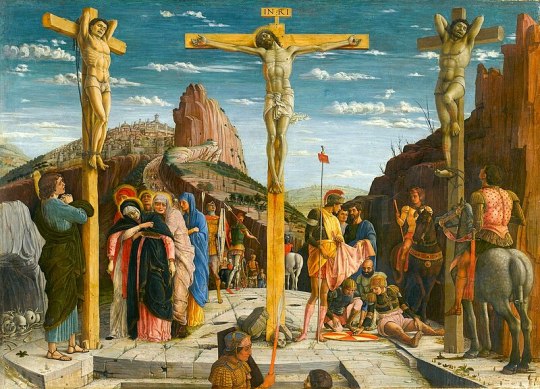
Now, crucifixion is a longstanding execution method that dates back way before Jesus was even thought of. We've got accounts of crucifixions dating back to the Persians under Darius I, and we've got even more accounts from all over the place in the ancient world.
Now, let's go over some history real quick, shall we?
~522 BCE: Polycrates, the tyrant of Samos, is crucified postmortem by some pissed-off Persians. Maybe.
We don't actually know if this one happened or not, but we do know that he was assassinated. That much is true. The crucifixion part is what's up for debate, but, if it is true, then Polycrates here has the privilege of being the first ever victim of crucifixion. Lucky him!
~519 BCE: Darius I orders the crucifixion of something approximating 3,000 political opponents in Babylon
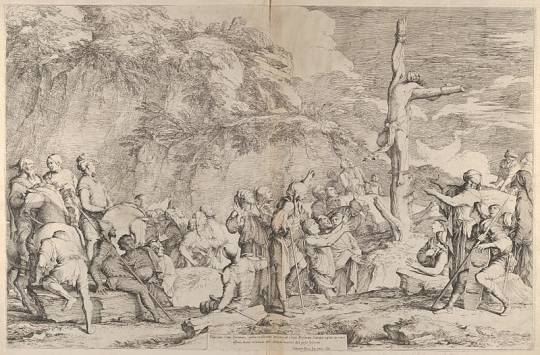
See, the thing about Persian crucifixions is that the prisoners weren't usually nailed to the cross shape we all know. Nah, they were tied up with their hands above their heads, strung up on a single pole. This way, their death would take a lot longer, and the prisoner would suffocate under their own weight. This would last for days, usually with the prisoner being left up to be humiliated even after their death.
~417 BCE: Persian general and tyrant Artaÿctes is crucified by Athenians in a rather uncharacteristic act
But also take this with a grain of salt because this account comes from Herodotus, and I don't trust that dude with much more than a fun story.
The Greeks didn't really think much of crucifixion. They were like, "We're above this. We are civilized", but also. They did not like the whole "Persian Invasion" thing, and so sometimes they ended up resorting to measures they weren't too happy with. Such is war!
~332 BCE: Speaking of war, Alexander the Great supposedly had 2,000 survivors of his siege of Tyre crucified.
The thing with Alexander is that a lot of what people say about him is probably bullshit.
~88 BCE: Ancient Judean king Alexander Jannaeus supposedly had 800 Pharisees-slash-rebels crucified in the middle of Jerusalem
And now we get to the Romans, who kinda perfected the whole thing. They were super into crucifixion. They were so into it that they had a bunch of different ways of doing it!
Getting impaled on a stake
Getting tied to a tree
Getting tied to a crux simplex (see image below)
Getting stuck to a cross

The whole crucifixion thing was seen as a way to deter people from doing the same crimes that the crucified people did. It was all about torture and humiliation. We have reports of people being crucified for days, and of people having to carry their own crucifixes (see: Jesus Christ.)
Sometimes people were tied to their crucifixes. Sometimes they were nailed to them. It varied by region and by criminal and by executor. Criminals were generally stripped completely naked (again, humiliation), though, again, the position depended on the region, criminal, and executor. The way Jewish people were executed was different than how, say, slaves or renegade gladiators were executed.
I'm not going to get into the whole process because that's very long and yucky. But I will repeat just how popular it was! Because MAN, the Romans LOVED it! Crassus ordered the crucifixion of at least 6,000 rebels and followers of Spartacus after the Third Servile War (but, then again, he was a piece of shit.)
Of course, we can't forget about the most famous crucifixion of all:
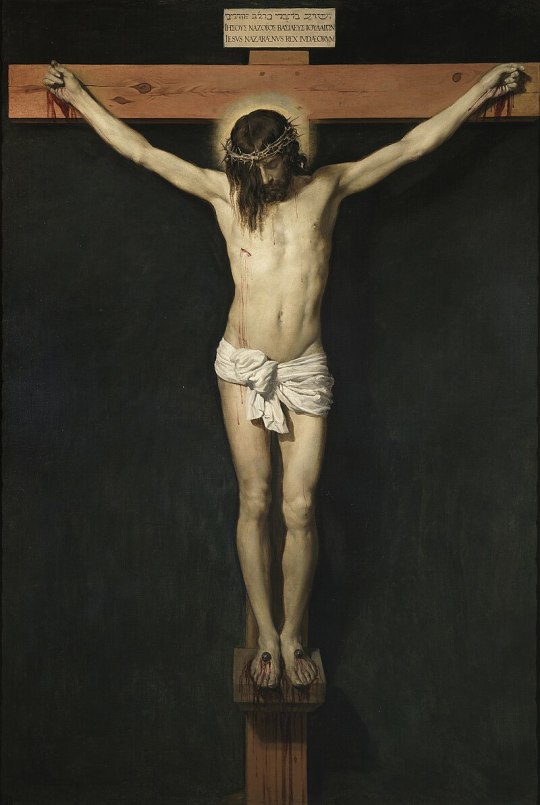
~32 CE: Jesus.
Jesus of Nazareth remains the most famous victim of crucifixion, and it's because of the nature of his particular crucifixion that everybody thinks of crucifixion as The Thing With The Cross.
And this is probably what everybody's thinking of when they're talking about the QSMP inmates being crucified today.
But he wasn't the only religious figure to be crucified!
Cut to:
Either 274 CE or 277 CE: Mani, the Parthian Prophet and the founder of Manichaeism, is crucified in a way super similar to Jesus
Tbh we don't know when he died, but his followers purposefully compared his death to Jesus' despite there possibly being literally no crucifixion involved at all.
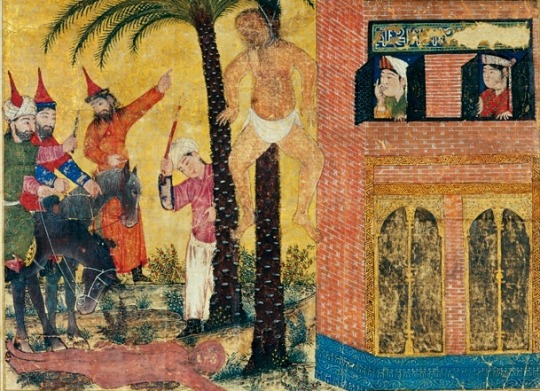
But, you know what? Crucifixion happened all over the place!
Islamic territories had crucifixion going on simply because they lived where crucifixion had been taking place for centuries, and there was a lot of debate surrounding crucifixion in relation to the various rules and regulations surrounding criminality and the potential justification of execution.
Japan, interestingly enough, also has a pretty long history of crucifixion. Supposedly, it was introduced in the 15th century by pesky Christian missionaries, but the Japanese had had a similar tradition going on before that. But Japanese crucifixion, called haritsuke wasn't really like the kind we're familiar with. There was water crucifixion (mizuharitsuke) reserved for Christians, and there was upside-down crucifixion (sakasaharitsuke.) Fun!
(There is photo evidence of this even up on the Wikipedia page, but you can find that on your own. I'm not putting that on my blog, thanks.)
As the years continued, crucifixion became a bit less widespread, though there is photo evidence of its use in Japan up through the 19th century, and then reports of it being used in World War One by the Germans and then in World War Two against the Germans.

Unfortunately, it's still a practiced tradition in a few parts of the world. Saudi Arabia and Sudan still have crucifixion as an execution method, and it's still a reported method being used by certain extremist factions in Syria, Iran and Myanmar.
So... yeah! That's crucifixion for you! It's a truly terrible fate, but not an overtly religious one. It only really became religious when Jesus ended up getting killed, and, even then, it's only seen as such by groups of people steeped in Christian culture (such as many countries and cultures living in what people call "The West".)
I can only imagine that the religious aspect is what's going to come into play on the QSMP, because I doubt that this literal Minecraft Roleplay Series will employ actual literal torture and execution methods live on Twitch.
#a.d. talks history#qsmp#i guess! i talk about it!#anyway all my sources are basically from my head and from some quick research#can you tell i was raised catholic?#and that i took a class on ancient persia last year? lol
47 notes
·
View notes
Note
not to be a jerk, but I feel like Alcibiades really represents Classical Athens: he was intellectual, well-known, betrayed his allies in the end, was respected as much as he was hated…
*chewing at the bars of my cage as usual*
I've said this before, others (as in, experts and such) have said this before:
Alcibiades was the very personification of the 5th century Athenian democracy. He died when the city was defeated (in Xenophon we see the thirty tyrants knowing that as long as Alcibiades lived, athens still had hope, and thus advising the spartans to have him killed) and it never fully recovered its power after that.
13 notes
·
View notes
Text
I’ve finally read Pet and am kicking myself I didn’t read it sooner!
I’ve measured out the short stories like I’m nibbling on chocolate, Charlie Bucket style, and I was leaving this till last partly because of that, and partly because I didn’t feel that interested in Ancel (sorry Ancel, I take it back).
It’s fascinating reading about events that occur in Captive Prince but not from Damen’s POV. The idea that everyone has complexities under the surface, and that things aren't always as they seem, is only understood by Damen negatively in the first half of Captive Prince I think. Veretians are untrustworthy and slippery and Machiavellian. And that's not, not true! The Veretian court IS a pit of vipers. But people are also still human, and it's that extra step of understanding the humanity underneath even these acidic, performative snakes which is interesting. Ancel is sharp and smart (and really needs to be taught how to read forthwith). Berenger is morally admirable, and isn't actually sleeping with him. Vannes cares about Berenger in her own small way. Laurent emits a great deal of power and is "instantly commanding" to others (but not to Damen, which must have really infuriated him).
Here’s some more snippets of my thoughts in general:
Waxing is canon! So interesting. Why does no grown man ever shave in the books also? Why isn't attending, also shaving? I think we'll just have to accept that as Pacat's choice. Maybe the only blade she wanted between them was the ghost of swords from a long ago fight/swords in the present?

Isagoras the writer/poet- any connection to Isagoras the historical figure who was embroiled in a power play in terms of Athenian politics and democracy? Who Aristotle called ‘friend of tyrants’? Obviously he’s not meant to be that figure but is it a sort of irony and foreshadowing for the political choices Berenger has to make?
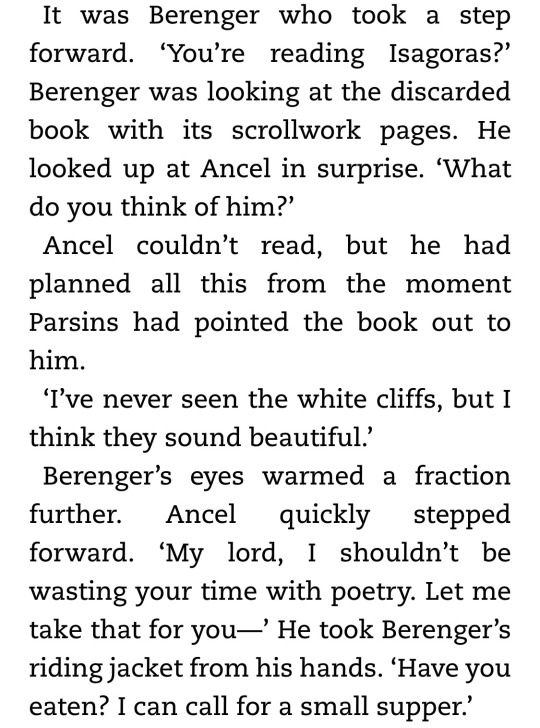
And Akielon writing/poetry is popular among men with status? Interesting. You wonder if Laurent approved a poem waxing lyrical about Ios, or really anything that suggested the Akielons aren't barbarians.
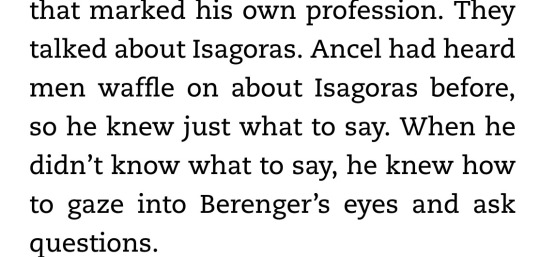
I feel as if Damen would know this poem, and read it to Laurent as part of courting him 🥺

Interesting to see a first impression of Laurent from the viewpoint of someone not instantly obsessed with him- severe and harsh, but no mention of his beauty till later.

I mean this nicely but Damen really has no idea how naturally arrogant and superior he comes across as in this situation, does he? I mean, it’s completely understandable if you think of Akielon society, and how he’s been raised and treated; in fact it would be implausible any other way based on his character traits too. He’s just so bad at pretending to be a slave even as his life is at risk if they find out he’s a prince 😂 oh Damen /pets his curls/. And oh, a *lion* you say....
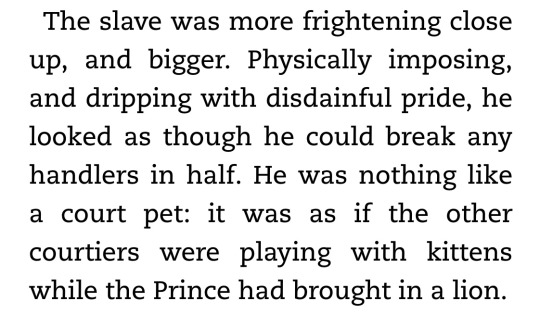
Just really bad at acting servile, it's so funny. Love him.

Speaking of Lamen, it is a little unsettling how quickly Damen starts to fall for Laurent in Captive Prince and how Laurent truly does hate him, yet…is clearly on some molecular level, attracted to him, I think? It’s just a really heartbreaking and stressful dynamic. His "complete attention" on him...let's face it, if Damen had looked like Govart, Laurent wouldn't be fixated in the same way (I mean this nicely).
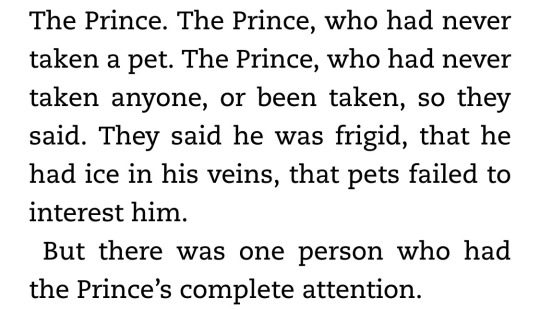
Oh my baby Laurent. You know this isn’t right. Are you reenacting a past trauma? Making him suffer what you suffered? Even if you aren’t, your flaw is letting your hatred and anger blind you to your morals. (Lucky a man is going to fall in love with you who is pretty much always on your side even when you don’t always deserve it…). Damen will help you be more honourable /pats blond head/
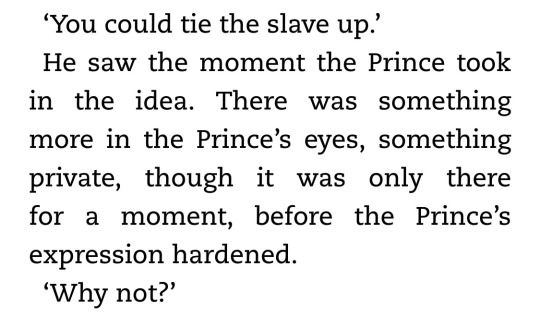
"Locked” is an apt word isn’t it, considering all that ties them together (and not to mention the gold cuffs and collar…) and oof, Laurent's sexual domination in this scene is quite apparent.

and…

I mean, we all know this is sex by proxy and so does Ancel, who just met Laurent and Damen!

And lastly, I am team Berenger. He's a Good Man and would probably get on pretty well with Torveld and Nikandros, the other dark haired, loyal and responsible men in the trilogy.

Nice to see someone see commoners as people all year round (not simply when their villages are being massacred and their humanity is thrown into stark relief by it)!
123 notes
·
View notes
Text
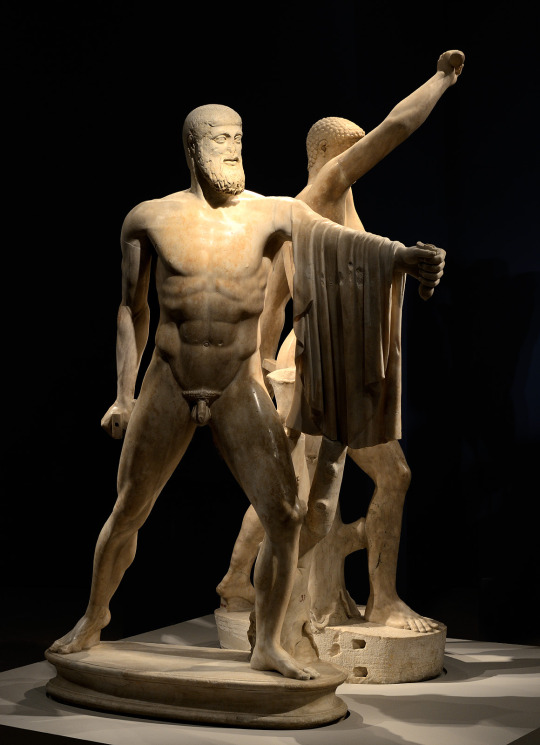
Harmodius and Aristogeiton (Statutory Pair)
Following the death of the Athenian tyrant Pisistratus, his two sons Hippias and Hipparchus came to power in Athens. Herodotus, Thucydides, and Aristotle’s description of the Athenian Constitution all describe how tyrannicides Harmodius and Aristogeiton killed Hipparchus.
Hipparchus attempted to make advances on the young Harmodius. Harmodius was already the lover of Aristogeiton and rejected his advances. Hipparchus, in retaliation, proceeded to invite Harmodius’ sister to participate in the Panathenaic Festival as kanephoros, a sacred and coveted position in which an unmarried virgin lead the procession to the festival’s sacrifice. Hipparchus then publicly disqualified her on the grounds that she was not a virgin, humiliating and insulting her and Harmodius’ entire family.
Aristogeiton and Harmodius organized a revolt to bring down Hipparchus and Hippias in the middle of the upcoming Panathenaic Festival. In a panic they attacked too early, and, although they killed Hipparchus, Harmodius was killed in the following confusion, Hippias managed to flee, and Aristogeiton was caught, tortured, and executed. Although their revolution failed they captured the imagination of Athenian citizens for centuries to come.
Unknown. 2nd Century CE copy of statues by Kritios and Nesiotes from 477/476 BCE. Museo Archeologico Nazionale di Napoli.
48 notes
·
View notes
Text
Learning Epithets 1 - Demeter Achaea
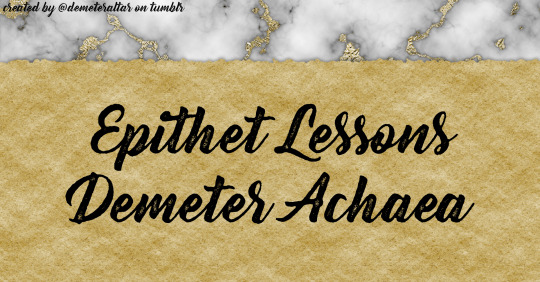
When beginning Hellenism, I was told to look and pray to epithets. I didn’t really understand and I feel like I still don’t, so I am here now to try and learn along with you guys about what each epithet means and how to pray to it. So, for our first installment, I have here the first epithet listed on Theoi.com: Demeter Achaea.
As listed on Theoi.com, Demeter Achaea is describe as the following:
a surname of Demeter by which she was worshipped at Athens by the Gephyraeans who had emigrated thither front Boeotia
I did not really understand any of those words, so I did some digging. I knew Athens, obviously, and the Gephyraeans had to be a group of people, but how was it all connected?
I will say this: I did some research and got a LOT of answers, mostly for things I didn’t ask for. It was all pretty interesting though, and I think Lady Demeter wouldn’t mind so long as I was learning something. First, though, I will warn you that my rambling is pretty entertaining, but if you just want the epithet and how to pray / what to use the epithet for, feel free to scroll to the bottom.
The Research:
So first I wanted to know what Achaea meant. I found out it is a region. I look up the region, and it is located in north Peloponnese, Greece’s southern peninsula. It is a mountainous region with major cities of Patras and Dyme. Patras itself is huge in Greek history, and one of the most important cities behind Athens (seriously, I could write a whole paper on the history of Patras itself). Dyme had Oebotas, the first Achaean to win the Olympic Games, but no one in Achaea celebrated him, so he cursed them to never have another winner. This curse remained until Sostratus of Pellene won, after Achaea built a statue to honor Oebotas in Olympia. It is also a region referenced in the Old Testament.
This is all very interesting, but it really did not answer any of my questions, mostly because it had nothing to do with Boetia, Athens, or Gephyraeans. This led me to research the Gephyraeans, and there is barely anything of note except that they are from Boetia.
Boetia is, of course, another region in Greece, styled as Boeotia. This is the region where Thebes was located. Boeotia is another region where a whole paper could be written about it, as it is the location of many myths and legends, such as the Theban Cycle, the Muses, Dionysus and Semele, and more. However, there is still not a lot on the Gephyraeans.
One thing I could find on Gephyraeans were Harmodius and Aristogeiton, who were lovers and assassins of the tyrant Hipparchus and are known as heroes for Athenian democracy (of course, there are lots of political drama but that is also it’s own page because the story is VERY very interesting). Herodotus mentions that they are Gephyraeans, which are Boetians of Syrian or Phoenician descent. However, Plutarch argues they are otherwise.
So, now we have some answers to our question. About Gephyraeans heading into Athens, I found this quote from Herodotus:
“It was in the reign of this Laodamas, the son of Eteocles, that the Cadmeians were driven by the Argives out of their country, and found a shelter with the Encheleans. The Gephyraeans were left behind, but were later compelled by the Boeotians to withdraw to Athens; and they have certain set forms of worship at Athens, wherein the rest of the Athenians have no part; these, in especial the rites and mysteries of Achaean Demeter, are different from the other worships.” Herod. v. 61
So it seems that the Gephyraeans, descendents of Syrians or Phoenicians, went to Athens and had a unique way of worshipping Lady Demeter. The Athenians had no part in this worship. However, why did they worship Demeter specificially? At first glance, it appears She has no hand in Achaea, but according to one of the myths, she does.
Triptolemus, an Eleusinian prince, was instructed by Demeter to spread agriculture and allowed him the use of her serpent-drawn chariot. This myth is incredibly interesting! For our purposes, Triptolemus went to Patras in Achaea. There He taught Eumelus how to cultivate corn. Eumelus’ son, Antheias, took the dragon chariot and fell to his death. Eumelus named a city, Antheias, after him.
So we have a geographic region, the group of people that used this epithet, and some myths connected to Demeter surrounding it. But as I was researching, I kept thinking, ‘I should probably look up what the word achaea means’. Not the region, just the etymology.
It took a bit of digging, rewriting, and stumbling onto questionable websites. I found a lot of sources for Bible naming websites, saying the origin was Hebrew and one even said African? I think I am safe in saying that these are inaccurate.
Finally, I found a Quora post, and though I would question secondary information, it was the best lead I could find. And in this I found the answer.
The Epithet:
Actually, no one is certain what achaea actually means. It is spelled Αχαΐα and is derived from Αχαιοί (Achaeans), the Ancient Greek tribe that settled in the region. Achaea is used specifically for this and this only. But what does it mean?
According to some, it is derived from the word αχος (achos) which means pain or distress. They were named after Achaeus, the founder of Achaea, who was born in a time of great suffering. Also, as written by Hesichius, Demeter was called Αχαία (achaea) because of her grief of losing Persephone.
In other circles, it is derived from the word αχαιαι (achaiai), which means “surf” and refers to the rocky coastline.
It is also worth noting that when Homer refers to the Greeks, he mostly uses the word “Achaeans”. The word is also older than ΕΛΛΑΣ (hellas), meaning Greece.
According to HellenicGods.org, the epithet Akhaia is used for Demeter’s grief for her daughter, but makes no mention of the Gephyraeans.
Long story short is, who knows? It is more likely the location and is something sacred to the Gephyraeans, but ancient etymology is hard to research since it is lost to time - it is, however, very interesting to look into these things. It’s sort of like connecting a puzzle.
What we do know is that there was worship and even sanctuaries dedicated to Demeter and Persephone in Achaea. All of this comes from Pausanias. He describes a sanctuary in Aegium dedicated to Persephone, and a connection from Zeus Homagyrios to Demeter Panakhaia. Also in Bura, there was a temple and drapery dedicated to Demeter. Additionally, there is a place near Pellene, but I thought it would be best for you to read it from Pausanias himself:
"About sixty stades distant from Pellene is the Mysaion, a sanctuary of Demeter Mysia. It is said that it was founded by Mysios, a man of Argos, who according to Argive tradition gave Demeter a welcome in his home. There is a grove in the Mysaion, containing trees of every kind, and in it rises a copious supply of water from springs. Here they also celebrate a seven days' festival in honor of Demeter. On the third day of the festival the men withdraw from the sanctuary, and the women are left to perform on that night the ritual that custom demands. Not only men are excluded, but even male dogs. On the following day the men come to the sanctuary, and the men and the women laugh and jeer at one another in turn.” Pausanias, Description of Greece 7. 27. 9
It is interesting to note that this last one held the Mysia festival, dedicated to Demeter Mysia!
How To Worship:
As it appears that this epithet is specific to a location, there’s probably not much you can do with this specific epithet unless you were:
In this region
Wanting to pay homage to the region/myths
Any other reason because I don’t control your worship, you do
That’s not to say anything bad about this epithet. It’s so interesting to learn about the culture, geography, and history of Ancient Greece. At the very least, I know a lot more now than I did at the beginning of this. Also, now I know more about Lady Demeter and Her connection to locations. Plus, isn’t learning more about Her the whole point?
We could take inspiration from this and make our own epithet about the region we all personally live in. For example (and not to dox myself or anything), I live in the Appalachia region. Appalachia is beautiful and has a long history. We are known for our spooky forests, cryptids, and religion, but I think the presence of mountains, forests, nature, animals, and more is a perfect place for Demeter worship. I think honoring her by connecting with nature and cleaning up the environment is a great place to start.
For you, maybe you live in a city or a desert. Is it not still Earth? You can honor Demeter with the environment around you. Grow a cactus, buy a fake plant, clean up trash, or pour your leftover water on grass or plants. Maybe you will pray to Demeter Achaea, or any other epithet, or one unique to you!
Thanks for reading, and if I got something wrong, feel free to correct me. I’d love to hear what you all have to say!
SOURCES:
Demeter Cults
Demeter Titles and Epithets
HellenicGods.org
Mysia Festival
Triptolemus
Wikipedia: Achaea
Wikipedia: Boeotia
Wikipedia: Gephyrean
Wikipedia: Harmodius and Aristogeiton
Quora Articles
#demeter#demeter worship#demeter achaea#epithets#hellenism#pagan#hellenic polytheism#hellenic pagan#hellenic deities#greek goddesses#greek mythology#greek gods#mine#theoi#theoi worship#hellenic polythiest#hellenic gods#pagan help#triptolemus#persephone
10 notes
·
View notes
Text
Welcome to my little blog, lovelies🦉
Today is 4th of Metageitnion (21st of August)
As I embraced a more consistent approach to my practices, I couldn't help but notice a glaring gap in accessible resources. It's true that one could attempt to scour the internet for information about Hellenic holidays and events, but who has the time or inclination to sift through exhaustive 10k word Wikipedia articles? All that just to discover that recreating authentic Hellenic rituals and practices is nearly impossible! What a pain, huh?
Picture a scenario: a holiday is on the horizon, and the desire to honor the Gods in a meaningful manner ignites within. But there's a problem – there aren't many good sources of information to help you figure out what to do. It's like a big roadblock that makes things confusing. So, here's the big question: how can we solve this problem and find a way forward?
Fear not, for I am here to give a guiding hand to all baby pagans, inquisitive researchers, and all those intrigued by Hellenic polytheism. Allow me to explain the ways Hellenic polytheists manage to slip their practices into their daily life, and provide you with insights, rituals, and a roadmap to navigate through ancient traditions. On this platform, my goal is to make this special belief system easier to grasp, so you can really understand the important rituals and traditions.
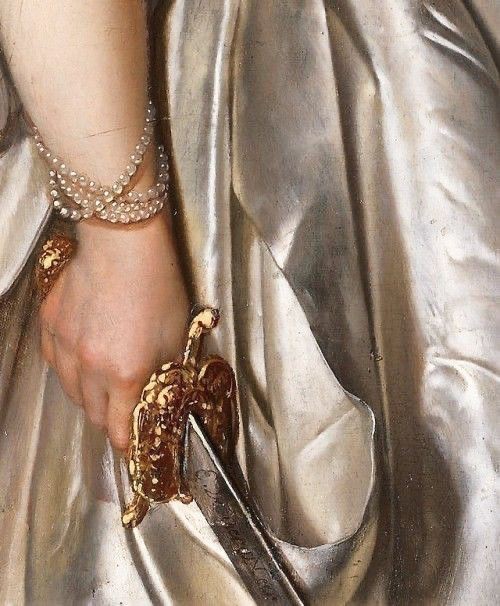
A special week (23rd-30th of Hekatombaion/10th-17th of August) has just came to an end, finishing the 8-day-long premier festival of the year - Panathenaia! And to be even more specific, this year (2023) we were graced to celebrate Panathenaia ta megala (Great Panathenaia) an occasion that only happens once every 4 years!
A history lesson about this festival for anyone interested!
The Panathenaia is the celebration of Athena's birthday, for it is an ancient belief that on the 28th of Hekatombion, Athena bursted from the very head of Zeus. Though it is her day, all the Olympians attend the festivities. This is a sacred feast at which gods and mortals celebrate Athena's birthday together.
Beginning in the 7th century BCE, the annual festival, the Panathenaia ta mikra (Lesser Panathenaia), involved an impressive procession from outside the walls of the city to the Acropolis and the main purpose of the procession was to convey the new peplos for the image of Athena.
The loom for this peplos had been set up at the festival of Khalkeia (in Pyanepsion), nine months before, by priestesses and young girls (Arrephoroi) particularly dedicated to the worship of Athena and the weaving had been carried out by the Ergastiai (workers), maidens chosen from Aristocratic families. Now the colossal wool garment, with traditional yellow and blue decoration woven into it was carried in a ship-like cart. Everyone in Attica took part: Kanephoroi, young women who bear baskets on their heads (containing the meal/grain to through on the sacrificial victim); Diphrophoroi (Chair bearers), young girls carrying chairs; Thallophoroi, green branch bearers who were old men; young men wearing purple robes (the Skaphephoroi, or tray-bearers) of the resident non-citizens carried trays of cakes and honeycombs as offerings; daughters of Metics carried water jars; and freed slaves and other non-Greeks carried oak branches. Representatives of subject city states of the empire brought suits of armor and a cow as offerings and all of them were likely in the parade as well.
The annual Panathenaia included several other distinctive elements: a torch race (run by Athenians only), an all-night service (the Pannychis) and a meat meal for everyone at the city’s expense.
Then in 566/5 BCE, athletic games open to all Greeks were added to the festival so that, every fourth year, the city observed Panathenaia ta megala (Great Panathenaia). And late in the 6th century, the tyrant Peisistratos added musical competitions and recitations of the poetry of Homer. Athletic events included foot-race (stadion), pentathlon, wrestling, boxing and pankration, in three age categories: men, beardless youths and boys. Horse competition were also held, including four-horse chariot, two-horse chariot, horses ridden singly, javelin-throwing from horseback and races for foals as well as full-grown horses. Winners received, among other things, olive oil purportedly from the sacred olive tree of Athena in distinctive white and black amphoras.
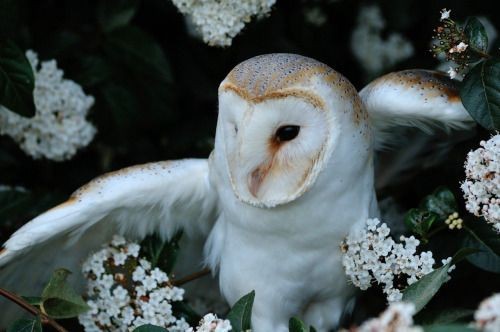
Wow, all that sounds like a huge event, don't you think? It sure is! But you won't catch anyone butchering a HUNDRED cows as a offering in honor of Athena these days.
I believe Gods are always around us, they understand and see how the world changed thus why some of the rituals can't be practiced anymore. All we can do is take inspiration from the ancient ways people used to celebrate these holidays.
How can we celebrate Panathenaia nowadays?
Unfortunately, me and other people who follow Hellenic traditions can't get a whole city to bring back these old practices. So, we usually make the festival shorter, just for one night or day if it's easier. During this night, the procession is added to by the bearing of a torch. Libations are poured to Athena, most often with olive oil, milk, wine and/or honey. Most of us don't want to do something as big as butchering a cow, so we stick to offering a piece of beef to Athena instead and partaking of the meal as well, as the celebration did not call for a holókaustos (burning) of the ritual offering.
We should honor Athena with offerings, prayers, reading of Hymns (Orphic Hymn 32 and Homeric Hymn 28), and with a communal meal. Consider planning night-time worship starting at sunset. If possible, arrange running races, contests, and a torchlit procession. Study Athenian history, art, and architecture. Additionally, learn about Athena's stories, Athens' history, and your own city. Some make garments for the statue of Athena, showcasing our care. Embrace sculpting, sketching, painting, sewing, and more!
If you want your ritual to be really fancy (which I absolutely love) I highly suggest following the steps of the user LeopardBoy here:
What I personally suggest doing?
Such a big way to celebrate is sure fun, no doubt. But let's be honest here, that's really a lot!
I suggest celebrating Panathenaia by a wake (full night of worship), and here is an idea of how possibly it could go:
8:00PM - 10:00 PM: this is the time for final preparations. Clean up the space (Hestia doesn't like things out of place as we know, so you can go ahead and mop the floor, vacuum, move everything out of the way), prepare your altar, lay out everything you need for personal cleansing, your offers to the Gods, everything you need to burn and pour offerings
10.00 PM - 11.00 PM: Torch procession (lit with Hestia's flame) from outside the living room to the shrine, cleansing (called katharmos), hymns to Hestia (Homeric Hymn 24), to Nyx (Orphic Hymn 3), to Selene (OH 9), to the Stars (OH 7), to Sleep (OH 85), to Dream (OH 86), to Zeus (OH 15) and finally to Athena (HH 11/HH 24), libations of olive oil to Hestia and Athena with a repeating of their respective hymns, making a cloak for Athena
11.00 PM - 12.00 PM: katharmos, libations of red wine to Hestia and Athena after proclaiming their hymns, offering of chocolate to both Goddesses, reading the Odysseia by Hómēros
12.00 PM - 01.00 AM: katharmos, libations of milk to Hestia and Athena after proclaiming their hymns, reading the Odysseia, preparing the candle making
01.00 AM - 02.00 AM: katharmos, libations of honey to Hestia and Athena after proclaiming their hymns, candle making
02.00 AM - 03.00 AM: katharmos, offerings of barley to Hestia and offerings of beef to Athena after proclaiming their hymns, divination session, reading the Odysseia
03.00 AM - 04.00 AM: katharmos, libations of honey to Hestia and Athena after proclaiming their hymns, reading about the history of Hellas and Athens
04.00 AM - 05.00 AM: katharmos, libations of milk to Hestia and Athena after proclaiming their hymns, reading about the history of Hellas and Athens.
05.00 AM - 06.00 AM: katharmos, libations of red wine to Hestia and Athena after proclaiming their hymns, reading the Odysseia, finalizing the candles.
06.00 AM - 06.30 AM: katharmos, libations of olive oil to Hestia and Athena after proclaiming their hymns, reading the Odysseia, cleaning up the space.
Don't be afraid to change up some things, the way you perform rituals is supposed to be meaningful to YOU!
If all you can do is simply dedicate the day to think about Athena, send a prayer and pour libation of tap water into a cup, that's enough!
See you next time:)
Sources:
Adkins, Lesley and Roy A. Adkins, Handbook to Life in Ancient Greece, 1997
Apollonius Sophistes, “Seasonal Festivals of the Greeks and Romans”
Burkert, Walter, Greek Religion, English version 1985
Parke, H. W., Festivals of the Athenians, 1977
#hellenic polytheism#hellenism#paganism#hellenic pagan#pagan holidays#pagan community#paganlife#athena deity#athena#religion#holiday#celebration#hellenic polythiest#panathenaia#Spotify
23 notes
·
View notes
Photo

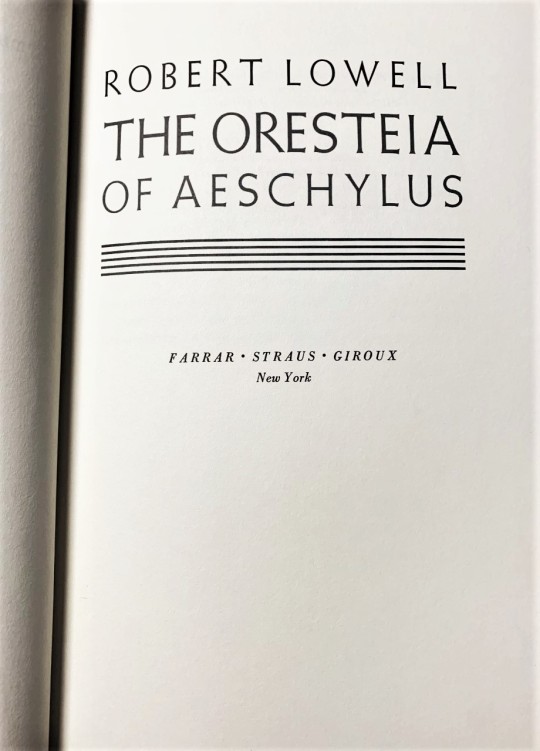

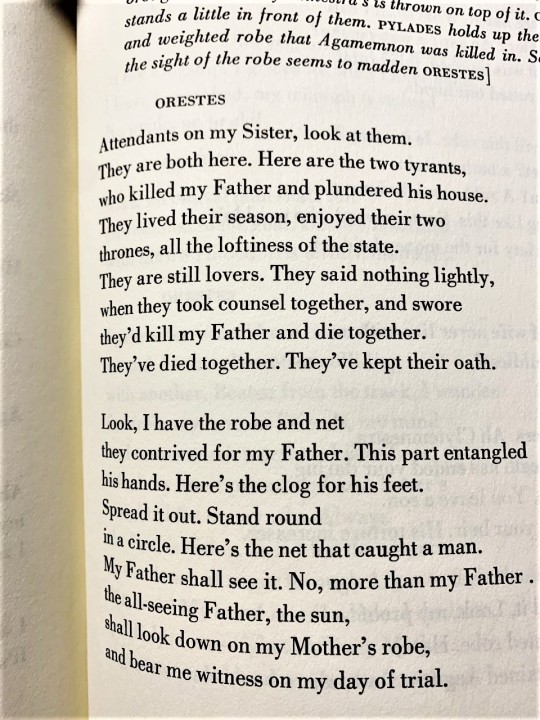
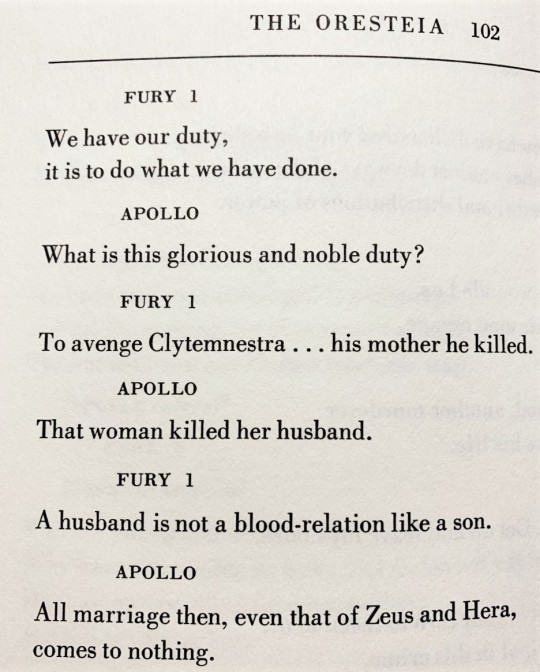
Justice, the Court System, and Drama in Athens
After ousting of the last tyrant of Athens, Hippias, in 510 BCE, and establishing Athenian Democracy, several new departments of governance needed to be created. One of the most crucial was that which presided over justice. Up to this point in Greek history, justice was the responsibility of the wronged party’s family. This commonly meant that if someone were killed, the victim's family would need to track down the murderer and kill them in return. This often resulted in a cycle of revenge with rival families, continuously thinning each other down to the point of non-existence. Given that such feuds tend to weaken a state rather than strengthen it, the Athenian government sought to take justice into the state's hands, thus leading to the establishment of the Athenian court.
This style of delivering justice had never been seen in the Greek world up to this point. The mythical origin of this system is reflected in Athenian playwright Aeschylus’s Oresteia, the only known surviving trilogy of dramas from the ancient Greek world. One of Special Collections’ several editions of these plays (our oldest is a Parisian printing in Greek published in 1552) is this one translated by the noted American poet Robert Lowell and published by Farrar, Straus, Giroux in 1978.
The story of the Oresteia is broken down into three plays, Agamemnon, The Libation Bearers, and The Eumenides. Agamemnon tells of the murder of Agamemnon, King of Mycenae, by his wife Clytemnestra after his return from the ten-year Trojan War. The Libation Bearers relates how Agamemnon’s son Orestes returns years after his father’s murder to seek revenge against Clytemnestra on Apollo’s orders, but after killing her becomes the target of the Furies' merciless wrath. The Eumenides illustrates how the sequence of events in the trilogy ends up in the development of social order or a proper judicial system in Athenian society with Athena setting up a trial in Athens for Orestes, the first courtroom trial. Orestes is acquitted, which the Furies reluctantly accept, leading Athena to rename them the Eumenides, “The Gracious Ones.” Athena then proclaims that all trials must henceforth be settled in court rather than being carried out personally.
From this series of plays, Aeschylus was able to demonstrate his belief in how integral the Athenian justice system was to maintaining the strength and stability of Athens, rather than being subject to the whims of familial vengeance cycles.
View more of my Classics posts.
– LauraJean, Special Collections Undergraduate Classics Intern
#Classics#greek history#Greek drama#Greek plays#Aeschylus#Oresteia#Agamemnon#The Libation Bearers#Eumenides#Robert Lowell#Farrar Straus Giroux#Greek courts#Greek trials#Greek justice#Ancient Greece#LauraJean
30 notes
·
View notes
Note
Have you heard of Critias and Theramenes? They were one of the 30 tyrants after the Peloponnese war where Spartans after winning the Athenians forced them to abandon democracy and have the tyrants the tyrants would choose. The most ruthless was Critias and the only one who stood up against him was Theramenes who was also an old friend of him and were students of Socrates before.
Their story is interesting even for the little information there is of them, and their dynamic reminded me of your paintings. Complex twisted relationships with depth in general.
oh, I think they're extremely fun! I went on a whole research adventure with the thirty tyrants when I was going through donald kagan's work on the peloponnesian war, and I'm waving hello at all of it again now that I'm reading through james romm's book on the sacred band of thebes
the reception of critias intrigues me ngl

The Use and Abuse of Critias: Conflicting Portraits in Plato and Xenophon, Gabriel Danzig
21 notes
·
View notes
Text
Athens may be the first Western democracy but it was no paradise for women:
One of the key things to understand with the history of Ancient Greece is that other Poleis besides Athens *did* write their own histories and views of themselves, but the Athenians were the ones whose view lasted and were taken as representative when they were not, in actual fact, necessarily so at all. The Greece of the Poleis extended to Massalia (aka Marseilles) in the far west, to Sicily and its Tyrants (which originally means what we'd call a dictator today), and to the various Poleis of what we more traditionally think of as Greece proper. These were more city-states as we'd consider them today, each designed in their own image, with their own elites.
Athens was but one of them, and one of a few, with Syracuse, Sparta, and Thebes, to seek to build empires before Macedon swept down and slaughtered anyone it disliked. So in looking at the realities that Athens was so ferociously misogynistic to a point that the Chinese literati would look at them and go 'aha, truly civilized men who understand how men are men and women are women' one must keep that in mind. So too the counterexample of Sparta.
So all that aside, how did women live in Ancient Athens? Unhappily. They were locked in gilded cages if they were lucky and the butt of all manner of literary libels and slurs if they weren't. Athenian women had very narrowly prescribed paths to take, all of which denied them roles in life that were really worth living and objecting to this could be rather dangerous, so they did not. As with later Jacksonian Democracy Athenian Democracy was purchased for the few at the expense of the many.
#lightdancer comments on history#women's history month#classical world#classical greece#ancient athens#athenian empire
3 notes
·
View notes
Text
THIS DAY IN GAY HISTORY
based on: The White Crane Institute's 'Gay Wisdom', Gay Birthdays, Gay For Today, Famous GLBT, glbt-Gay Encylopedia, Today in Gay History, Wikipedia, and more …


Peisistratus rides into Athens with Athene
605 BC – On this date the Athenian benevolent tyrant Peisistratus was born (d.527 BC). Peisistratos was the son of a philosopher and teacher called Hippocrates, and was named for the Peisistratos in the Odyssey. He lowered taxes and increased Athens' economy.
According to Plutarch he was the eromenos (Greek for "young lover") of the Athenian lawgiver Solon. He assisted Solon in his endeavors, and fought bravely in the battle of Salamis.
When Solon left Athens, Peisistratos became leader of the party of the Highlands (poor, rural people) in 565 BC. Peisistratos used a clever scheme, calling for bodyguards after he pretended to be attacked. Those bodyguards were composed of the people of the Highlands who had entered Athens. In 561 BC he seized the Acropolis with this group of bodyguards, becoming ruler. His rule did not last - he was driven out by Lycurgis, Megacles and others from the party of the Coast within the year. He returned 10 years later (in legend, with Athene at his side), regained power and reigned for 23 years until his death in 527 BC.
During his reign, many temples were built and he encouraged poets and artists by welcoming them into his court. According to a story first mentioned by the Latin author Cicero, Peisistratus ordered the writing down of the Iliad and Odyssey of Homer, which had previously been transmitted orally.

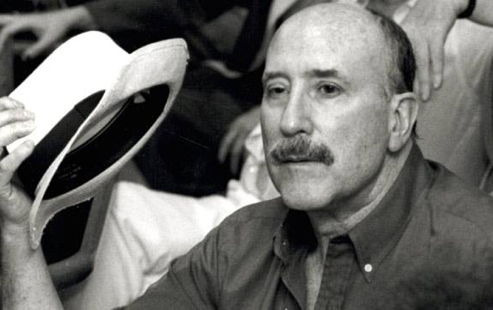
1930 – The Oscar-winning Spanish-born Cuban cinematographer Néstor Almendros, was born on this date (d.1992). Born in Barcelona, Spain, Almendros moved to Cuba at age 18 to join his exiled anti-Franco father. In Havana, he founded a cinema club and wrote film reviews. Then he went on to study in Rome at the Centro Sperimentale di Cinematografia. He directed six shorts in Cuba and two in New York. After the 1959 Cuban Revolution, he returned and made several documentaries for the Castro regime. But after two of his shorts (Gente En La Playa and La Tumba Francesa) were banned, he moved to Paris. There he became the favorite of Éric Rohmer and François Truffaut. In 1978, he started his Hollywood career, and won the Academy Award for Best Cinematography for the film Days of Heaven. Four years later he was nominated again by the Academy for his work on Sophie's Choice.
In his later years, Almendros co-directed two documentaries about the human rights situation in Cuba: Mauvaise Conduite (about the persecution of Gay people) and Nobody Listened (about the arrest, imprisonment, and torture of former comrades of Fidel Castro). He shot several prestigious advertisements for Giorgio Armani and Calvin Klein.
In 1992, Néstor Almendros died of AIDS in New York at age 61. Human Rights Watch International has named an award after him, given every year at the HRWI film festival.


1951 – P. Craig Russell is an American comics artist, writer, and illustrator. His work has won multiple Harvey and Eisner Awards. Russell was the first mainstream comic book creator to come out as openly gay.
Philip Craig Russell was born in Wellsville, Ohio. He entered the comics industry in 1972 as an assistant to Dan Adkins. Russell first became well known with his 11-issue Amazing Adventures run and subsequent graphic novel featuring Killraven, hero of a future version of H. G. Wells' The War of the Worlds, collaborating with writer Don McGregor. Comics historian Peter Sanderson wrote that, "McGregor's finest artistic collaborator on the series was P. Craig Russell, whose sensitive, elaborate artwork, evocative of Art Nouveau illustration, gave the landscape of Killraven's America a nostalgic, pastoral feel, and the Martian architecture the look of futuristic castles." At DC Comics, Russell inked Batman stories in Batman Family and Detective Comics over the pencils of Michael Golden and Jim Starlin respectively.
Withdrawing for a while from mainstream comics, Russell produced several experimental strips, many of which were later published in his Night Music series and Epic Illustrated.
In 1984, Russell began Night Music, an ongoing anthology series for Eclipse Comics featuring some of his most heralded literary and operatic adaptations. Russell has previously used the same title for a black and white collection of the earliest of these works, published by Eclipse Comics. Included in this series was "The King's Ankus," adapted from Rudyard Kipling's Jungle Book. Russell had previously inked several Jungle Book adaptations drawn by Gil Kane, published in Marvel Fanfare #8-11 (May-Nov. 1983). The series included "Pelleas & Melisande," adapted from Maurice Maeterlinck's play of the same name which had been turned into an opera by Claude Debussy, and "Salome" adapted from Oscar Wilde's play of the same name which was the basis for Richard Strauss's opera. Opera would continue to resurface in Russell's work, including a four-part adaptation of The Magic Flute, taken from Wolfgang Amadeus Mozart's opera.

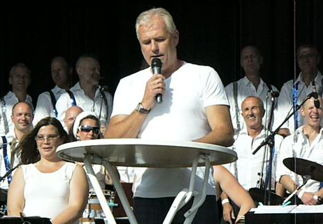
Hysén speaks at Stockholm Pride
1959 – Glenn Hysén, born in Gothenburg, Sweden, is a football manager and former player who played for leading Dutch, Italian and English clubs and won 68 caps for Sweden. He is also a reality television star, coach, and football commentator.
Hysén is the father of Tobias Hysén of IFK Göteborg, Alexander Hysén of GIF Sundsvall, and Anton Hysén of Utsiktens BK.
At Frankfurt Airport in 2001, Hysén attacked a man who had groped him while in the public restroom. In 2007, Hysén spoke at Stockholm Pride, the largest gay pride festival in the Nordic region. Many people from the gay community were surprised due to the earlier incident. At the Stockholm Pride, he delivered a speech denouncing sports homophobia and laid to rest his 2001 airport incident.
He stated that,
"I know that many LGBT people have been the victims of assaults and hate crimes. I can therefore understand if some people have been upset by the airport incident, so I want to be clear: I think that it is completely unacceptable that anybody should be subjected to assaults, insults or hate crimes due to their sexual orientation or gender identity ...The incident had been blown out of proportion in the media...In order to finally flush the Frankfurt Airport punch down the toilet: it is not the case that I beat up a gay person. I categorically deny that ...I'm not proud that I took a swing at him, but I am proud that I have integrity and that I reacted."
In the same speech he asked "How easy would it be for a sixteen-year-old boy who plays football to come out as gay to his team mates?" In March 2011, his youngest son, Anton Hysén, a professional footballer himself, came out of the closet to the media.

1966 – on this date the Belgian ice-skater and singer Geert Blanchard was born. He was the first gay Belgian sports-man who came out publicly.


4 notes
·
View notes
Text
Seven Specifics: Fill out the seven questions, tag others
I was tagged by @m-b-lynch- thank you❤️!
Relationship status: Yes, much to the detriment of my long-suffering partner🤣🤣🤣
Favorite color(s): steel blue
Song in my head: Currently? Death, Oh Death by Vera Hall. Last week it was Bunkhouse Orchestra’s unique take on Turkey in the Straw and Johnny Adams’ Hell Yes I Cheated. Those D&D randomizer charts? are for noobs😂
Last song listened to: been on a JD Jarvis kick lately, so Palms of Victory. Small aside—is it just me, or is listening to JD sing like, a whole other level? JD’s troop was one of the first to storm the beaches on D-Day, he was shot several times, and there is just no effing way he should have survived. But—he recovered from his wounds, worked in coal mines and as a house painter/contractor, recorded a couple of dozen records, and lived into his eighties😳
Last thing googled: I can neither confirm nor deny that I may have recently gone down a rabbit hole on the different bits of art that have survived depicting Harmodius and Aristogeiton.
Who are they? So—gay couple assassinates a tyrant. Gay couple are executed. Greek artists keep putting the now martyred gay couple on stuff, and also create kickass sculptures which the Romans then copy. Flustered art historians dub these two ‘the tyrancides’ and hope nobody actually looks up the story. Oh and the sculpture is flat out wrong, because Harmodius was basically the Athens equivalent of a twink😆
And yes, I have now babbled about both **checks notes** LGBTQ Athenian art history AND bluegrass gospel history🤪
oh look! squirell!!!
moving on…
Favorite food(s): Salsa, coffee, fresh cookies, anything with jalepenos😋
Dream trip: I would love to camp in the general vicinity of North Dakota/Montana/Idaho but all the workcamping gigs seem to be on this side of the Mississippi. Admittedly, my caravan might possibly-potentially-if-I-am-really-lucky get 11 miles to the gallon* so this is not necessarily a bad thing😁
*with a stiff tail wind. downhill.maaayyybe
tagging @cowandcalf @distilled-prose @distancebetweenpages @pocketfullofpoesies @wordrummager @oddman-the-oldman @itwoodbeprefect @teruel-a-witch @torrentialmonsoon
11 notes
·
View notes
Text
OKAY new chapter of will you greet the daylight looming? is live! Tow-part warning for this one. One: Chunks of this are just a perspective flip of events from the balance of life is in the ripe and ruin, so yes, this is the same dialogue as last time. Two: Related to that, Sindri's current and Kratos's past suicidal ideation are both hinted at, though less explicitly than other fics. At least you guys can go in knowing for sure that one has a happy ending.
AO3 link will be in a reblog, full chapter below, full fic tagged on my blog also!
will you greet the daylight looming?
part 3/6: summer
cws: suicidal ideation (hinted), fantasy racism (mentioned). ragnarok spoilers throughout.
.
“Interesting choice of training weapon.”
The voice still sent a jolt down Kratos’s spine, despite knowing it no longer belonged to an enemy. He fought the urge to summon his own spear as he turned around. Týr stood at the fence, watching his students run through their drills. “But it makes sense,” Týr continued conversationally. “That’s how you would’ve started, right?”
“Hmm.” Kratos still did not know how to react to the true Týr. On the one hand, he was nothing like Odin’s impersonation. There was a thoughtfulness to him that the tyrant had not been able to capture. Kratos could almost picture Týr debating with the philosophers of Greece in his free time. He seemed to have no interest in war or power, but was not so aggressive about it as Odin had depicted. He was simply a man who had fought enough for now, and wished to go home to his family and crops.
But Odin had captured his face and voice perfectly. The memory of that voice going cruel as Odin drove the knife into Brok still haunted Kratos. And then there was the memory of Týr’s treasure room. The bottle of Lemnian wine. The pot with Kratos’s likeness on it,
How much did the war god know?
“You visited Sparta?” Kratos asked carefully.
Týr shook his head. “I only ever knew of it by reputation,” he said. “And I was never sure how much of it was true.”
“If you heard it from an Athenian, it was a lie,” Kratos said immediately.
Týr chuckled. “RIght, and I’m sure you can be trusted to tell the truth about Athens,” he replied.
“They made a great many contributions to Greece. And they were annoying.” And the less said about Athena herself, the better. “I’m surprised I never heard of your visits.”
“Oh, I made a point of keeping to myself. Greece was a beautiful place, but…”
Týr hesitated. Kratos turned his attention to his students. Hopefully, it looked as though he were supervising them, not as though he were avoiding eye contact. “Say what is on your mind,” he said.
“...I never met him directly, but Zeus reminded me of Odin in some ways,” he said. “Not exactly the same, but I left Asgard to avoid thinking about my family.”
“Hmm.” Kratos could see some resemblance. The same obsession with prophecy and habit of stabbing their children, for starters. Same habit of damaging lives with their meddling. It seemed to be a requirement for being king of the gods.
“I’m glad you got out,” Týr added, “for what it’s worth.”
Kratos felt a surge of adrenaline, though he knew no physical attack was coming. It was accompanied by a deep feeling of dread, nausea, revulsion. “That is not how I would put it,” he said.
Týr hesitated again. “I don’t know how else to put it,” he said finally. “I heard of how things ended there, but you could have…stayed, mentally. Remained trapped in it all, spread that distrust and hatred. Instead, you’re doing this.” He nodded towards Kratos’s students. “Helping people. I’ve heard about what you and Freya have been up to. So…you got out, in the end.”
The clarification made sense, and soothed his heightened emotions somewhat. Not entirely, though; his scars still tingled. “I suppose. I only wish…”
Wish I could have done it sooner.
Týr smiled sadly, a look of understanding in his eyes. “Me, too.”
Kratos thought about Týr, held hostage in Niflheim for imagined crimes. He thought of Deimos, bound for sins he hadn’t committed yet, and would never get the chance to commit. He imagined how difficult it must have been to push against an unmoving object like Odin.
He was lucky to be alive at all.
“We are not our fathers’ pasts,” Kratos said quietly.
“Yeah,” Týr said. For the first time, Kratos did not see the threat of Odin in him. For the first time, he saw a possible ally. “I sure hope not.”
.
There was more to Skjöldr than Kratos had realized.
Kratos had seen glimpses of the boy’s work ethic before. Skjöldr had been one of the primary organizers as his people settled back in Midgard, and seemed to be treated as a leader among his peers. These traits became more pronounced as they progressed in their training. He was first to volunteer, obeyed orders while still asking the right questions, and had a talent for encouraging the others. He was, of course, still a mortal boy–growing into his body, voice cracking at odd times, still learning the ways of the world. Kratos did not want to ask too much of him too soon. But he was well on his way to doing something great with his life.
He also had a very encyclopedic knowledge of fish.
“They’re the same fish,” Skjöldr explained, “but the coloration is completely different in Asgard. I still kind of think it’s due to some magical influence.” He started gutting the fish with careful precision. “I’d love to go to Vanaheim and see if there’s a pattern. I’d ask Lady Freya, but…y’know.”
“She’s intimidating?” Kratos guessed.
“No…well, yeah, but it’s more that it’s…dumb? I don’t want to bug the Queen of the Valkyries by asking her about fish.”
Freya would probably welcome the question, Kratos thought. It would be a break from the monotony of questions about Draugr or the pockets or trouble-makers they still had to deal with. But he kept that thought to himself and continued skinning his own fish. “You learned all of this yourself?” he asked.
“No, my dad…” Skjöldr hesitated. “...is a fisherman. He taught me. I’ve had to pick up a lot of it since he just started walking again. His leg got pretty busted up during…y’know.”
Ragnarök. Some were still hesitant to invoke it by name. Kratos understood. “But it is healing?”
“He’ll probably have a limp, but yeah, it could have been worse.” Skjöldr straightened up suddenly at the sound of wings nearby. “Is that…?”
Kratos didn’t have to look up to confirm that it was. He knew that sound by now. The Valkyries were back, and Thrúd with them if the crackle of lightning in the otherwise clear air was any indication. Kratos could hear them talking among themselves. It seemed like they’d missed a few holes out of Helheim. That was irritating. He heard footsteps approaching; Skjöldr attempted to sit up straighter as they grew close. “Hey, Thrúd,” he said.
Ah. Kratos made a point of looking down at the fish he was cleaning. The boy was already nervous. There was no point in making it worse. “Hey, Skjöldr,” Thrúd said. She gave him a friendly punch to the shoulder. Her being a goddess, the “friendly” punch nearly knocked Skjöldr over. He didn’t seem to mind. “Keeping everyone fed?”
“Trying to. Uh, everything going okay with the, uh…Helheim stuff?”
“Oh, y’know. Helheim is Helheim.” Kratos felt knuckles nudge into his own shoulder in an attempt at a similar punch. It didn’t move him at all. “Kratos.”
Kratos grunted. He glanced up long enough to see if Freya was there. She stood nearby, examining her swords carefully. Frost marked the edges. Good hunting, if he had to guess. “Where were they entering Midgard?” he asked.
“Oh, right next to Jörmungandr’s head,” Thrúd said with a laugh. “He did half the work for us. Not sure they tasted any good.”
Skjöldr laughed, perhaps a little too quickly. Oh, poor boy. If it had been any other goddess, Kratos might have considered intervening as soon as possible. He still considered it, but not for any fault of Thrúd’s. The heartache of a mortal and an immortal was potent. He knew that from experience.
But he was not the boy’s father, and that was probably a mistake he’d have to make on his own. So Kratos kept his eyes on the fish.
Freya sat down next to him with a sigh. “They’ve got you doing manual labor?” she asked.
“I volunteered.” He liked the normalcy of it. If he feared one thing, it was becoming too used to being a proper god again. He may not be running from his true nature anymore, but he did not want to be some distant thing sitting on a throne. He wanted to keep the life he had created for himself–fish guts and all. “The river’s thawed entirely. Travel should be easier now.”
“Finally. I thought some of those chunks would never clear away.” Freya glanced at Skjöldr and Thrúd. She was talking about her Valkyrie duties while he listened attentively. “Oh, dear,” Freya said quietly.
Of course she’d noticed. Love was one of her domains; if it was obvious to Kratos, it was probably a full signal fire to her. “Best of luck to him,” Kratos said quietly.
She didn’t audibly laugh, to her credit, but he could see the amusement in her eyes. “Best of luck indeed.”
Kratos waited until there was a lull in the conversation before asking his next question: “Do you have fish like this in Vanaheim?”
Skjöldr’s eyes darted over to them, looking surprised, but he kept his mouth shut. Freya examined the fish. “Similar, but they’re more of a…sunset color, I guess you could say. Why?”
Kratos shrugged. He knew the lack of answer wouldn’t give much away; Freya was used to him not answering questions by now. It wasn’t as if she could find him any more odd than she already did.
The grateful look on Skjöldr’s face made it worthwhile, anyway.
.
He had only seen Angrboda in the Ironwood or the Wild Woods. She’d alluded to returning to Jötunheim proper a handful of times (“Just looking around”), but beyond when she helped them during Ragnarök, she seemed content to stay in her part of the world.
It caught Kratos just as off-guard as everyone else when she arrived in Midgard.
“Hey, is that Loki’s friend?”
It was. And Kratos immediately noticed the change in the air around them. He’d set up the training grounds close to the mortal’s growing town, close enough that there were always people walking by. Those people were staring. Visibly.
She hadn’t come with Fenrir. It was just Angrboda, her arms wrapped around herself tightly, her gaze more frightened and rabbit-like than he’d ever seen it. Kratos stepped closer to her, carefully scanning the staring faces, searching for any signs of threat-
“Angrboda, right?” Skjöldr said. He had put down his spear and was approaching her with a friendly smile. “Loki’s friend? I’m Skjöldr.” He held out his hand. “Are you here to train, too?”
“Oh, uhm…” Angrboda unfolded enough to shake Skjöldr’s hand. “No, I was just here to say ‘hi.’”
Some of the students were still staring. Skjöldr’s friendliness seemed to put them at ease, but they were still curious. They had never seen a giant before, Kratos realized. They had only heard stories of them, and likely stories filtered through the lies of Asgard. None of them seemed hostile, at least, but…
“Drills,” Kratos called sternly. “Your enemy is over there.” The students quickly went back to their straw dummies. “Skjöldr, you as well.”
“Yes, sir,” he said immediately. To Angrboda, he added, “We should talk sometime! I never got to thank you for helping.”
“It’s no problem,” she replied with a hesitant smile. “Glad you’re okay.”
Kratos waited until Skjöldr was out of earshot before moving closer to Angrboda. “Are you all right?”
Angrboda let out a shaky breath. “I’m okay. I just…I guess I wanted to see if it was really okay out here. You mentioned coming here a lot, so I thought it’d be safe.”
Of course. She wanted to see how one of the last giants in the realms would be treated for showing her face. If Atreus did return with more giants, that would be important to know. “I would have escorted you,” he said quietly.
“I didn’t really plan to come here today, but thank you.” She seemed more relaxed now that he was close. “I haven’t been to a town in a while. It looks nice.”
“They’ve done well for themselves. There’s been help from Vanaheim and the Aesir left…” He noted one of the students was struggling with her form. “I’ll be right back.”
Kratos was worried that some trouble would find Angrboda in the time it took him to help the student and return. But she was still standing at the fence when he was done, and no one accosted her during her visit.
It may have been naive of him, but Kratos hoped that was a good sign.
.
Skjöldr made a point of including Angrboda after that whenever he saw her. Kratos suspected it was out of loyalty to Atreus more than anything, but he was still grateful. Angrboda herself opened up quickly to the attention, losing the wariness she’d had that day very quickly. He might be the second person her age she’s ever spoken to, Kratos realized. Perhaps that was the other reason she’d risked showing herself.
She was lonely.
“So, these are…” Skjöldr looked up from the hinge he was fixing. “...what, past, present, future?”
“Sometimes. And it really depends on when you see it.” Angrboda kept her eyes on the shrine. They needed some attention after three years of snow. She’d insisted on repairing the art herself while Kratos and Skjöldr tended to the doors. “This used to be past, present, future. Now it’s more like…beginning, middle, end, I guess.”
“Yeah, that makes sense. Much as any of this makes sense.”
Kratos understood that sentiment. He tried not to think about the complexities of prophecies now that they were no longer a matter of life and death. He had struggled with the decision before, but Kratos was grateful now that Faye had never told him about it until she absolutely had to.
He wondered how she had stood living with it herself.
“Does Jörmungandr know this is in here?” Skjöldr wondered. “It must be weird for him if he does. Knowing your whole life story is out there somewhere…I don’t think I’d be able to live like that.” He hesitated. “I’m not on any of these, right?”
“Not that I know of,” Angrboda said. “Guess that means you can do whatever you want.”
Skjöldr looked relieved–then, almost immediately, nervous again. “Okay , that sounds really scary when you put it like that.”
Mimir barked with laughter. Even Kratos couldn’t hold back a chuckle. “Really no winning is there?” Mimir said. “The burden of choice.”
“Better than being a story with the end written,” Angrboda noted quietly.
Kratos hummed in agreement. He waited until Skjöldr moved away from the open door and nodded before releasing it. It settled back on its hinges, now fully repaired. The shrine may not have been good as new, but it looked much better than it had. “Do you think we can move them one day?” he asked.
“I think they’ll be okay where they are for now, but I’ve thought about it,” Angrboda admitted. “Maybe once things settle down a bit more.”
Maybe once more of the giants return and can make that decision, if he had to guess. But Angrboda was still careful not to discuss that in mixed company. She had been treated fairly so far, but Kratos understood her caution.
Eventually, Skjöldr had to go back into town, leaving Kratos and Mimir along with Angrboda. He was content to watch her paint at first, her hands carefully tracing the pre-existing lines. She was the first one to break the silence: “Thanks for the help with this.”
“You’re welcome.” Kratos examined the canvas before them. “I was hoping…to learn.”
“About the prophecies?”
“About the giants. I know Faye left long before she met me, but they are her people. I want to know.” It was the least he could do to respect her memory. The memory of the family she had only talked about once, but with so much pain in her eyes. “I want to understand her.”
Angrboda set her paintbrush down and looked at him, understanding in her eyes. “I’d love to tell you,” she said quietly. “Do you think you could tell me about her? I know she meant a lot to a lot of people, but I don’t think they knew…her. You know?”
Kratos nodded. “Of course. She would have liked you, I can say that.” His gaze swept over the shrine, the carefully restored paintings. “She was an artist herself.”
“Really?” Angrboda looked pleased. “So Atreus got it from her?”
“Yes.” His Spartan training had covered more than most people assumed. Neither drawing nor painting was on that list. “They were alike in many ways. I know it will serve him well.”
“So will what he got from you.”
The compliment hit him harder than he thought it would. “...thank you.”
He hoped she was right.
.
The invitation was unexpected. Kratos hadn’t had much chance to return to Niðavellir since Brok’s funeral. The dwarves had largely kept to themselves in the wake of Ragnarök, trying to rebuild their realm without outside interference.
But they remembered him, apparently, because Durlin arrived one mid-summer day with an invitation. “We’re tearing down the statues the Aesir left up. Want to help?”
Kratos found he did. And with the dwarf’s permission, he invited Freya and Angrboda as well. The former declined; the latter agreed wholeheartedly, though Kratos had a feeling the possibility of seeing a new realm influenced her decision. She was practically bursting with excitement when she arrived with Fenrir in tow.
“This place is amazing!” she said.
“It certainly smells nicer than it did,” Mimir noted.
Kratos grunted and kept an eye out for grims. They were going to a statue near a mining operation, not the one in town. It was probably for the best, considering Fenrir was there. The wolf was as excited as Angrboda, eagerly taking in all the new smells. Word of his size must have reached Niðavellir, because the few dwarves Durlin had assembled weren’t too alarmed at the sight of him. Still alarmed, but it could have been much worse. “What the fuck were you feeding that thing?” Durlin asked.
“I’ve seen bigger beasts,” Kratos said. The actual answer would take too long. “We thought he could help.”
“Yeah, no shit.” Durlin glanced Angrboda’s way. Like the citizens in Midgard, he seemed to figure out quickly that she was a giant. Unlike the citizens of Midgard, his reaction was much softer. “You want the first hit, little lady?”
Angrboda examined the statue critically. It was about as much an eyesore as the one in Niðavellir city proper. Then again, Kratos had a feeling it would be difficult to make Odin look good at all. “Actually,” she said, reaching into her bag, “there’s something I was thinking about doing first…”
She had small sacs filled with paint. The first slap of bright green struck the statue right in the eye patch, splattering across the face. It was strangely satisfying to watch; the cheers that accompanied it were even more so. Angrboda quickly started distributing the paint balls among the dwarves. Kratos was content to position Mimir so he could hurl insults and watch from a safe distance. Durlin joined him. “She seems like a sweet kid,” he noted. “Reminds me of someone we know.”
“Hmm.” Kratos glanced Durlin’s way. The dwarf’s eyes were fairly clear today. It was difficult to tell if he had stopped drinking entirely, or had decided he wanted all his faculties for the occasion. “You knew her well?”
“Not as well as I’d thought, apparently. Never would’ve picked her as the wife and mother type.” Durlin huffed a quiet laugh. “I’m happy for her, though. She deserved that peace.”
The dwarf’s voice softened as he spoke about her. Kratos was still getting used to hearing that tone when others spoke of her. She had been cared for by so many before him. It was comforting, to know that she had people around her even in her worse days. “You cared about her,” he noted.
Durlin’s next laugh was louder. “Not jealous of you, if that’s what you mean. But someone might be. Half of Niðavellir was in love with her by the end. You’re lucky you managed to get her before one of us did.” More encouraging shouts broke out in front of them. Fenrir had started digging at the statue’s base while the others egged him on. “Think they could use the extra muscle.”
In truth, Kratos could have brought the statue down single-handedly, but he knew the others needed the catharsis. He only expanded as much energy as needed to get the statue lowered down, allowing the others to bring it down entirely. The energy of the crowd was somewhere between a celebration and a battle. Fortunately, most of the insults being hurled were in Dwarvish. Kratos had a feeling they would be too strong for Angrboda.
Then again, he had no idea what her hurled insults were, either. She may have had a broader vocabulary than he realized.
Kratos was helping pry the statue’s head off when he heard it. The shout was distant at first, but quickly solidified into a familiar voice: “Kratos? Kratos?!”
It was Lúnda. When Kratos turned around, the dwarf was running towards them. Her face was as frantic as her tone. Kratos immediately ran to meet her. “It’s Sindri,” she gasped before Kratos could ask. “It’s…”
Kratos suddenly felt very cold. “Where?” he demanded.
“Back at the house…I don’t know, but something’s wrong. Please, I don’t know what to do.”
She was frightened. This woman had fought alongside Freyr against the Aesir, and this had her rattled. Kratos looked over his shoulder. Angrboda must have sensed something wrong; she’d followed him closer, but kept a safe distance away to avoid eavesdropping too much. “I have to…” Kratos started.
She nodded immediately. “Yeah, go. Fenrir can get me back home. I think I’ll be okay on my own.”
“Are you sure?”
“I’ll look after her,” Durlin said immediately. His face remained calm, but Kratos saw one hand anxiously fiddling with one of his vest buttons. “Make sure he’s all right.”
“Thank you.”
His last sight of the group was Fenrir chasing after Odin’s severed head. He wished the sight could bring him any joy. All he could think about was Sindri.
I should have gone to the house more. I should have spoken to him before this. The thought that he had been giving the dwarf too much distance had crossed his mind, but never for long. He had other things on his mind: helping Freya, training his students, looking after Angrboda. But now all he could think was that he’d been using those tasks to avoid making things right. That he could have cut into the time spent on his own, used that to repair this wrong.
Repair it now. There is no sense dwelling in what-ifs.
He was bracing himself for something terrible. What they found when they reached the house was not what he’d expected. Somehow, that only made things worse.
The house was completely abandoned. The only sign of life was the upturned bucket on the floor, and the brush beside it. The main room smelled strongly of soap and damp, molding wood. The worst damage was centered around a spot near the table.
The place where Brok had breathed his last.
“He’s not upstairs either.” Lúnda ran down the stairs, dislodging her goggles as she ran a hand through her hair. “He was here when I left, I swear.”
“What the blazes was he doing?” Mimir asked.
“I don’t know. He was…talking crazy, saying Brok was in the floor or something. I don’t know what was wrong.”
Kratos knew. He may not have experienced it in the same way Sindri was, but he knew its root cause far too well.
“He is grieving,” he said quietly. Of course Sindri wasn’t behaving rationally. Nothing about grief was rational. For a moment, Kratos was back in Greece, sharpening his knife to the point of damaging it. He knew it was too much, but he couldn’t make himself stop. It was the only thing that made sense in light of the unthinkable. His friend, the man he would name his son after one day, gone.
And that was the most rational thing grief had driven him to do.
“We’ve gotta find him,” Lúnda said. “He shouldn’t be alone when he’s like this. I just don’t know where he’d go.”
Kratos did, or at least he had an idea. It’s where he’d go, if he’d known what he knew now. “I will look,” he said. “You two should wait here, in case he comes back.” He could see the protest forming on Lúnda’s face, so he cut it off quickly: “He may not be receptive if all of us go. One is better than a crowd. And…I need to do this.”
I have to set this right.
Lúnda relented with a heavy sigh, taking Mimir without complaint. “Just bring him back, okay?” she said.
“Good luck, brother,” Mimir said, his eyes soft with understanding.
Kratos nodded to them both and left.
He managed to avoid breaking into a run until he was following the World Tree to Alfheim.
Atreus had spoken sometimes of speaking to his mother, asking her for guidance. Faye’s only prayers had been ancestral; according to Angrboda, this was a giant practice. The gods haven’t really done much for us. All we’ve got is each other. Kratos had never tried, being out of practice with prayer in general and unsure of what to ask her.
He spoke to her now.
Please. I know he’s your friend. I need to find him. Show me where he is, elskan. Help me find him.
Show me.
His time in Alfheim had been limited over the past months, but Kratos still remembered the way. Through the closest gate, to the Lake of Souls. With Lúnda’s help, they had been able to reopen a gate on the far shores, near the forge Sindri had used. That day had been difficult (trying to dodge the latest fight that had broken out had been tedious), but Kratos was grateful for the effort now. He half-expected to find Sindri there, hammering away at a weapon as he had that day in Midgard, but the forges were quiet and still. No sign of him.
Kratos stopped and forced himself to breathe.
He is likely here. He knows this is where Brok’s soul would have gone. But where is the best spot? Closer to the temple? It made the most sense. His hands shook as he shoved the boat into the water. Calm, he reminded himself. Panic will not serve you now.
Then, Faye, please.
He felt nothing but his aching dread until he reached the lake. He steered the boat towards the western shores–the beach near where Odin had kept one of the Valkyries. Good view of the light. Easy access to the water. And something else–a growing certainty that he wanted to trust. It may have been foolish, it may have been nothing…
There.
A pile of armor on the shore.
Pure instinct screamed at him to get out, get out now, get into the water, but he controlled it long enough to beach the boat. He’d risk losing it if he didn’t, and it would be faster to get Sindri home that way. A glance confirmed that the armor was his, which meant…
Kratos barely stopped to leave some of his own gear before plunging into the water.
The water was cool, and only grew colder the deeper he swam. Weeds and underwater plants swayed in the currents; a few times, he could have sworn they were not plants, but arms, hands, eyes watching him from the darkness.
Both eyes forward. Focus.
It was difficult to see, but the same impulse that had pulled him to the shore called him onwards. The deeper he swam, the more it took on a concrete form. A familiar voice–an even more familiar song. There was something different about it now, more urgent. Here, it whispered. He’s here. This way, my love, he’s here.
Kratos followed that feeling, even as his lungs started to burn. He followed it until a patch of darkness turned into something solid, into a small form drifting listlessly, dragged downwards by the plants.
There!
Kratos surged forward to grab the body. As he did, he could have sworn he felt something brush his cheek. Whatever it was, it gave him the energy to swim back to the surface, to the sunlight above, and from there to the shore. Sindri’s body was unmoving at first; when Kratos put him down, the dwarf’s lungs remembered to breathe. The first attempt brought convulsions, movement, Sindri turning over as he coughed up lake water onto the shore.
Kratos breathed a sigh of relief. Thank you. Thank you. The hardest part may have been yet to come, but at least he had the chance now. “Breathe,” Kratos said. “Slowly.”
Sindri’s coughing subsided. He wouldn’t look directly at Kratos. “Can you hear me?” Kratos tried. Sindri may have only been semi-conscious. Perhaps he needed more rest before-
“Why did you pull me out?” Sindri asked.
It was a question Kratos had not wanted to hear. It was also one that he understood.
Kratos sighed and sat in the sands, not too far away, but far enough to give Sindri space. He thought of Sindri’s face in the workshop that day, of his own deep pain in the deepest pits of Hades. Deimos and Brok, each twice-lost. “I had a brother,” he said. “The gods took him from me, too. It took a long time for me to…stop blaming myself for what happened. You should have that chance.”
Deimos. What would his brother think of him now? They’d barely had the chance to know each other. In truth, Kratos had envied Brok and Sindri sometimes. They had been separated for a time, but they still had many years shared between them. Kratos barely had six years when they were children, a handful of moments as adults. All the rest had been robbed from him because of some prophecy.
Some cycles couldn’t help repeating themselves, it seemed.
“You do not have to speak to me,” Kratos added. “I understand, you are angry. You have every right to be. But I am not leaving you here alone.” Not again, not this time. Not when the wounds were still so raw and open. Being alone is worse. He should have remembered that. Should have tried to convince Sindri of it sooner.
There was another stretch of silence. He glimpsed Sindri moving, not quite getting up, but hunching over less. When the dwarf spoke, his voice was barely a whisper.
“I killed him.”
Again, three words Kratos did not want to hear. And three words he understood.
“It’s my fault,” Sindri repeated, louder this time. His voice broke under the strain of his grief. “Oh, gods, I killed him.”
Sindri fell apart.
For a moment, Kratos felt he should not be there. This pain was too raw, too intimate; what right did he have to witness it? But he had sworn he would not leave. Now, more than ever, Sindri should not be alone.
He moved close enough to grip the dwarf’s shoulder. Sindri did not protest. Kratos still could not look directly at him, so instead he looked out over the water. Partially for threats. Mostly for answers.
How do I help him bear this?
How can anyone?
Sindri’s sobs quieted eventually. Once they had, Kratos stood and walked to the boat, and the pile of discarded items next to it. The Blades, Leviathan, a few of his own things. He made sure his weapons were out of the water’s reach and picked up a water skin before returning to Sindri. He grunted quietly and held it out in offering. “Do you have anything stronger?” Sindri asked, his voice ravaged by tears.
Maybe I should’ve brought something stronger. “Water first,” Kratos said. “You need it more.”
He sat back down in the sand, half-watching Sindri drink. The knuckles of the dwarf’s exposed hand looked red and raw, probably from the cleaning he’d been doing. He’d lost weight, too, his already thin face looking more haggard than before. He needs rest, Kratos though. Food. If he could be convinced to take it. “How did you know I was here?” Sindri asked as he handed back the water skin.
“Lúnda said you were distressed. Talking about Brok. I thought…”
If it had been me, I would have tried to bring her back, too.
“I heard her here,” Kratos said instead. “Both times. Your shop is not far. It seemed a logical place to start.”
“...Lúnda’s not here, is she?”
Kratos shook his head. “No, she stayed at your home. The head, too. I made sure they wouldn’t follow. You have time.”
He likely needed it. Kratos had asked them to stay for a reason. Just because Sindri shouldn’t be alone did not mean he needed a full audience for his grief. Kratos was sure his presence was bad enough. And yet despite that assumption…
“How do you do it?” Sindri asked quietly. “How do you…handle it all?”
Of all the people Sindri could have asked. Kratos almost wanted to laugh. “Not as well as you’d think,” he admitted. He cast aside his self-mockery and carefully considered his next words. “I simply lived with it, for a long time. If you can call it living. Faye, she…” He had to pause at the memory of that day in the woods. Of the first time she ever held his hand, soft and careful. “...she said once that we would always walk together. That she would always carry a part of me, and I of her. The culmination of love is grief, and yet…we still open our hearts to it. I did not understand what she meant until recently.” He only wished he could have understood sooner. “The pain…no longer feels like pain. Or it feels less so. Instead I feel her. What she taught me, what she gave me. It takes time to accept, but it is possible.”
Now more than ever, he was sure she was with them. That she had called them down to those waters. And even if he couldn’t feel it as clearly elsewhere, she was still with him.
She always had been.
“I mean,” Sindri, “Faye hasn’t been wrong yet.” Despite himself, Kratos chuckled. “She was right about something else. He who walks his own path walks alone.” Sindri met his eyes. They were still red from tears, tired and pained, but clear. “It wasn’t your fault, and…I’m sorry for what I said.”
Kratos had not realized how heavy the weight truly had been until it was lifted. This was not about him, he knew, but he was still…grateful. “You were grieving. I understand. It is behind us.” In the past where it belonged. Now, he could look to a future, one perhaps with Sindri in it. Except… “I do not know if you heard…”
“About Atreus or about Tyr?”
“Both.”
From the look on Sindri’s face, he had. Kratos was not entirely surprised. Atreus’s departure had been quieter, but not unnoticed; Týr’s reappearance, meanwhile, had certainly created a stir. Both would be hard for Sindri, Kratos knew, each in their own way. The only question was how hard, and how he would bear those weights as well.
“He’s going to be okay, right?” Sindri asked.
There was no anger in his voice, no blame. Instead, Kratos heard regret. He missed his son desperately then, and wished he could be there to mend things. But it could wait. Perhaps it was better if it did. “He will,” Kratos said. “I know he will.”
He accepted it as a certainty. His son would return. This could be mended. Both thoughts gave him some comfort.
He hoped they gave Sindri some comfort as well.
They sat in silence for a time. Kratos was grateful for the quiet, and equally unnerved that it was so quiet. Alfheim was never this quiet for him. Elskan, if this is you somehow, I am grateful…but why only this once? He could picture her laughing at the question, clearly as if she were there. I mean it.
“I don’t know if…if I can go back to the house,” Sindri said suddenly.
Kratos did not blame him. He wasn’t sure he wanted Sindri back in that place anyway. There was still too much pain there. Too many memories. “There is room in my home, if you wish,” Kratos said. There was never a doubt in his mind about that. “I cannot promise the wolves will leave you alone, but there is always a place for you.”
It was only right. Sindri was family, some of the first they’d found there. Kratos would have made the same offer to any of the others, but it felt especially important here. It’s what Faye would have wanted. That was reason enough.
Sindri considered it before nodding. “Okay. Okay. If you’re sure.”
“Hmm.” Kratos stood and offered Sindri a hand. “I’m sure.” Sindri hesitated, but took the help getting up. “Home, then.”
“Yeah. Home.”
They gathered their things and rowed back to the gate. Kratos only lingered a moment once the boat secure, pausing to close his eyes and let the sun warm his face.
He thought he felt that touch on his cheek again.
Thank you.
Kratos opened his eyes again, turned to the gate, and brought Sindri back home.
.
“You look tired.”
Sunset had turned Freya’s quarters golden. It was a space Kratos had only seen once, and briefly. It seemed more lived-in now, which was good. Freya hadn’t mentioned any resistance against her return to Vanaheim, but Kratos still worried. “I was going to say the same to you,” he retorted.
Freya rolled her eyes as she poured him a cup of mead. “It’s almost like being queen is exhausting,” she said. “Who would have thought?”
“Hmm.” Kratos took the cup with a grateful nod. “Anything I can help with?”
“Not really. We’ve just spent so much time under Asgard’s thumb. It’s…difficult, starting over.” She stared into her own cup, as if the answers were floating inside somewhere. “I think some people aren’t convinced Odin is gone.”
Kratos understood. There were times when he felt the same way about Olympus.
“What about you?” Freya added. “Those kids giving you trouble?”
“No. They listen well. They’re eager to learn.” They might have been the easiest thing he was handling lately, had it not been for one detail. “One of the parents…tried to give me an offering yesterday.”
“...oh?”
Kratos nodded. “I told her to keep it. Use it for her family. But they want to know what they should call me.” The admission made him feel ill. For a moment, he remembered the smell of burnt offerings, a statue in chains, the taste of blood and unsweetened wine. Nothing like the small bundle of food held in shaking hands, and yet everything like it at the same time.
“Are you really surprised?” Freya asked. “Most of their gods were just using them. You gut their fish and train their children to protect themselves with no expectation of repayment. If you didn’t want attention, you should have stayed in those woods.”
“I know, I know.” She was right, of course. Kratos took a long drag from his cup and sighed heavily. “It is not only that.”
“Your past?”
That as well, but not entirely. “My present. Sindri is still struggling. It is difficult to feel godlike when I can’t even help him.”
Sindri had more or less settled since that day in Alfheim, but grief still hounded him like a predator. Some days he would sweep the same patch of floor over and over, or move around the house carefully adjusting items so they were exactly in their place. He’d even insisted on tending to Kratos’s armor, as much as Kratos had tried to talk him out of it. I have to do something, he’d said. It’s like I’ve got this swarm of nightmares in my head, and doing stuff like this is the only thing that keeps them at bay. Do you know what I mean?
Kratos did, in a way. He was not sure he experienced it the same way Sindri did, but he understood the basic sentiment.
“You’re doing everything you can for him,” Freya said. “He’s not alone now. That’s what matters.”
Kratos wasn’t sure he felt that way, but he tried to believe it.
“I came here to see how you were doing,” Kratos noted suddenly. How had they gotten to talking about him?
“Well, in that case, please, let’s keep talking about your life,” Freya said dryly. Kratos laughed. “Have you been sleeping enough? Remembering to eat?”
“You can’t hide from your problems by fixing mine.”
“Oh, really?” Freya made a show of looking around her room. “Hold on, I think I have a mirror you can look at…”
“All right, all right. I yield.” Kratos sighed, for once in amusement and not in exasperation, and leaned back in his chair. “I propose an armistice. Neither of us discusses our problems. We are simply two friends having dinner.”
“That’s fine with me.” Freya took the opportunity to start drizzling honey over a thick slice of bread. “That said, there is…one thing you might be able to help with.”
He would, of course, without question, but… “Is it urgent?” he said.
“It will keep.”
He topped off his cup with more mead. “Then ask me when I’m done with this.” They could rest that long, he thought. Perhaps it would do them some good.
Freya smiled gently. “Okay.”
He drank slowly. They talked about the summer heat and returning plant life. Their problems kept for a little while longer.
They didn’t seem so insurmountable by the time he reached the bottom of his cup.
.
He returned to Midgard three days later thinking that he had spoken too soon. He did have some dragon scales for Lúnda to use and no one had died. That was about his only consolation.
And at least it’s not Aesir interference, he reminded himself. He had faced worse. And more annoying. But he was glad to be home.
Sindri hadn’t gone mad during Kratos’s absence. He supposed that was another victory. He was tense, but the dwarf was often tense, so Kratos assumed he would live through it. Neither spoke about how their days had gone. They only settled down around the fire pit to eat.
“I am this close to just replacing the fucking floors,” Sindri suddenly. “I don’t want to look at them anymore.”
Kratos nodded, more out of support than because he had truly registered the words. He had to run them over a few more times in his mind. He thought about the damp wood smell, that dark stain in the center of the floor. He hadn’t seen them since, but he doubted the time away had made things any better.
“We could do it,” Kratos replied.
“Do what?”
“Replace the floors.”
Sindri looked taken aback that Kratos had agreed with him.But after some consideration, he straightened up. “Yeah. Yeah, you’re right. We could. Uhm, I mean, if you’re okay with helping.”
“I am.” He didn’t like to think of the house in that state, and it might do Sindri some good.
It might do both of them some good.
16 notes
·
View notes